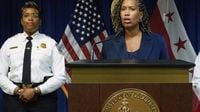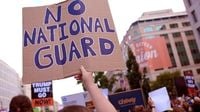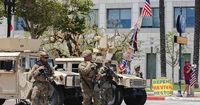On August 11, 2025, President Donald Trump made headlines across the country by announcing an unprecedented federal intervention in Washington, D.C., and hinting at similar actions for other major American cities. Speaking from the White House, Trump declared that he would invoke Section 740 of the District of Columbia Home Rule Act, placing the city’s Metropolitan Police Department under direct federal control and activating 800 National Guard members to patrol the nation’s capital. The move, which Trump said was necessary to combat rising crime and homelessness, has sparked a fierce debate over its legality, necessity, and potential consequences for American democracy.
"I'm announcing a historic action to rescue our nation's capital from crime, bloodshed, bedlam and squalor and worse," Trump proclaimed, as reported by ABC News. Trump further stated, “We’re going to take our capital back. We’re taking it back. Under the authorities vested in me as the president of the United States, I’m officially invoking Section 740 of the District of Columbia Home Rule Act, you know what that is, and placing the DC Metropolitan Police Department under direct federal control.”
The president’s announcement came on the heels of several high-profile incidents in Washington, including the killing of a Congressional intern and a violent attempted carjacking involving a former government staffer. Trump argued that these events were symptomatic of a broader breakdown in law and order, not only in D.C. but in other cities as well. He suggested that Chicago could be next, calling the city “a disaster” and sharply criticizing its leadership, including Illinois Governor JB Pritzker and Mayor Brandon Johnson.
Yet, as AP News and other outlets have pointed out, Trump’s assertions about surging crime do not align with the actual data. According to statistics published by Washington’s Metropolitan Police and cited by both the Associated Press and ABC News, crime in D.C. is down 7% since last year, with violent crime dropping 26% and property crime falling 5%. In fact, violent crime in the city hit a 30-year low in January 2025, and a recent Department of Justice report showed that violent crime had decreased by 35% since 2023. Homicides are down by 32%, armed carjackings by 53%, and assaults with a dangerous weapon by 27% compared to the previous year.
Mayor Muriel Bowser, who learned of Trump’s plan only through a brief call with the White House, called the move “unsettling and unprecedented.” At a press conference, she told residents, “We know that access to our democracy is tenuous. That is why you have heard me and many Washingtonians before me advocate for full statehood.” Bowser emphasized that the city’s parks, schools, and public transportation are thriving, and she urged the public to recognize the progress that D.C. has made. “Crime was down not just from a post-pandemic peak in 2023, but from 2019 levels prior to the pandemic,” Bowser said.
While some, such as the DC police union, have voiced support for a temporary federal intervention, most local leaders, civil rights advocates, and legal experts have denounced the action. The union’s chairman, Gregg Pemberton, said, “Immediate action is necessary,” but stressed the need for a fully staffed and supported local police force and called for the repeal of certain criminal justice policies. In contrast, District of Columbia Attorney General Brian Schwalb labeled Trump’s move “unnecessary and unlawful,” noting that crime is not at emergency levels and that the takeover could face a court challenge. “After a spike in 2023, violent crime hit its lowest level in decades last year and has continued to sink in 2025,” Schwalb said.
The deployment of the National Guard in D.C. is being conducted under Title 32 authority, allowing troops to support law enforcement. Defense Secretary Pete Hegseth explained, “Guard members will be flowing into the streets of Washington in the coming week,” but the exact timeline and scope of their duties remain unclear. About 500 federal law enforcement officers, including agents from the FBI, ATF, DEA, ICE, and the Marshals Service, have also been assigned to patrols in the city.
The legal basis for the takeover stems from Section 740 of the Home Rule Act, which allows the president to assume control of the D.C. police for 48 hours during emergencies, with possible extensions up to 30 days. Any longer would require congressional approval. Monica Hopkins, executive director of the ACLU of Washington, noted that no president had exercised these police powers before, making Trump’s move both historic and controversial.
Reactions were swift and polarized. House Minority Leader Hakeem Jeffries denounced the plan as “illegitimate,” saying, “Donald Trump doesn’t care about public safety. On his first day in office, he pardoned hundreds of violent felons—many of whom brazenly assaulted law enforcement officers on January 6.” Maryland Governor Wes Moore called the deployment “deeply dangerous,” accusing Trump of using the National Guard as a distraction from unpopular policies. Civil rights leader Rev. Al Sharpton went further, describing the move as “an assault on a majority Black city” and “the ultimate affront to justice and civil rights many of us have dedicated our lives to protecting and expanding.”
Trump, for his part, dismissed these criticisms and said he would not hesitate to take similar actions in other cities like Los Angeles, New York, and Chicago if he deemed it necessary. “We’re going to clean it up real quick, very quickly,” he said at the press conference. In Chicago, where violent crime has dropped 12.5% in the last year and shootings are down more than 31%, local officials pushed back. Governor Pritzker asserted, “The federal government does not have the right to send soldiers into American cities specifically to fight crime.” Mayor Brandon Johnson credited the city’s investment in violence prevention programs for the decline in crime and criticized Trump for cutting $800 million from the federal budget for such initiatives.
The controversy comes amid other major developments from the White House. On the same day as the D.C. announcement, Trump extended a trade truce with China for another 90 days, averting a potentially damaging tariff escalation. He also nominated E.J. Antoni, a critic of the government’s jobs report, to lead the Bureau of Labor Statistics after dismissing the previous commissioner. Meanwhile, the Congressional Budget Office reported that Trump’s recent tax and spending laws would mostly benefit the wealthy, leaving the poorest Americans with less income due to tightened restrictions on government assistance programs.
As the dust settles from Trump’s dramatic intervention in Washington, questions remain about the future of local governance, federal authority, and the delicate balance between security and civil liberties. For now, residents of the nation’s capital—and cities across America—are left to wonder what comes next as the boundaries of executive power are tested in real time.



